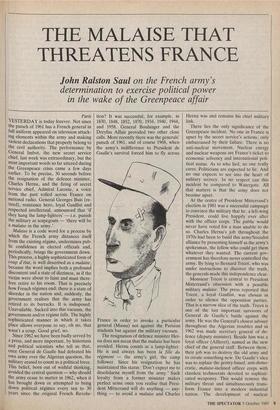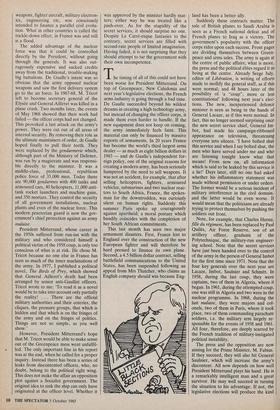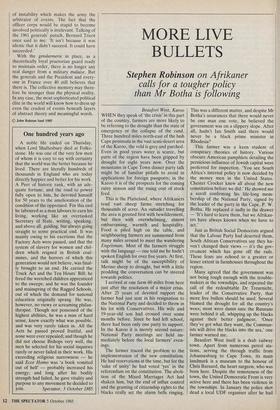THE MALAISE THAT THREATENS FRANCE
John Ralston Saul on the French army's
determination to exercise political power in the wake of the Greenpeace affair
Paris YESTERDAY is today forever. Not since the putsch of 1961 has a French general in full uniform appeared on television attack- ing elements within the army and making violent declarations that properly belong to the civil authority. The performance by General Imbot, the new secret service chief, last week was extraordinary, but the most important words so far uttered during the Greenpeace crisis came a few days earlier. To be precise, 30 seconds before the resignation of the defence minister, Charles Hernu, and the firing of secret service chief, Admiral Lacoste, a voice from the past rolled across France on national radio. General Georges Buis (re- tired), resistance hero, loyal Gaullist and respected intellectual, announced that 'if they hang the lamp-lighters' — i.e. punish the military as scapegoats — 'there will be a malaise in the army.'
Malaise is a code word for a process by which the French army distances itself from the existing regime, undermines pub- lic confidence in elected officials and, periodically, brings the government down. This process, a highly sophisticated form of coup d'etat, is well described as a malaise, because the word implies both a profound discontent and a state of dizziness, as if the victim were about to faint and must there- fore retire to his room. That is precisely how French regimes end: there is a state of disorder in the nation and, suddenly, the government realises that the army has retired to its barracks. It is indisposed. Unavailable. Sucked into this vacuum, the government and/or regime falls. The highly sophisticated manner in which it takes place allows everyone to say, oh no, that wasn't a coup. Good grief, no. Since 1962 we have been badly served by a press, and more important, by historians and political scientists who tell us that, once General de Gaulle had defeated his own army over the Algerian question, the military ceased to count as a political force. This belief, born out of wishful thinking, avoided the central question — why should the army cease to matter in 1962, when it has brought down or attempted to bring down political regimes every ten to 30 years since the original French Revolu- tion? It was successful, for example, in 1830, 1848, 1852, 1870, 1934, 1940, 1944, and 1958. General Boulanger and the Dreyfus Affair provided two other close calls. More recently there was the generals' putsch of 1961, and of course 1968, when the army's indifference to President de Gaulle's survival forced him to fly across France in order to invoke a particular general (Massu) not against the Parisian students but against the military vacuum.
The resignation of defence minister Her- nu does not mean that the malaise has been avoided. Hernu counts as a lamp-lighter. He is and always has been la fille du regiment — the army's girl; the camp follower. Since his resignation he has maintained this status: 'Don't expect me to desolidarise myself from the army.' Such loyalty from a former minister makes perfect sense once you realise that Presi- dent Mitterrand will do anything — any- thing — to avoid a malaise and Charles Hernu was and remains his chief military link.
There lies the only significance of the Greenpeace incident. No one in France is upset by the secret service's actions; only embarrassed by their failure. There is no anti-nuclear movement. Nuclear energy and nuclear weapons are France's ticket to economic solvency and international poli- tical status. As to who lied, no one really cares. Politicians are expected to lie. And no one expects to see into the heart of military secrecy. In no respect can this incident be compared to Watergate. All that matters is that the army does not become upset.
• At the centre of President Mitterrand's election in 1981 was a successful campaign to convince the military that he, a left-wing President, could live happily ever after with the officer corps. The public would never have voted for a man unable to do so. Charles Hernu's job throughout the 1970s had been to build this army/Socialist alliance by presenting himself as the army's spokesman, the fellow who could get them whatever they wanted. The current gov- ernment has therefore never controlled the army. By lying to Bernard Tricot, who.was under instructions to discover the truth, the generals made this independence clear.
Monsieur Tricot is central to President Mitterrand's obsession with a possible military malaise. The press reported that Tricot, a loyal Gaullist, was chosen in order to silence the opposition parties. That is a narrow slice of the truth. Tricot is one of the last important survivors of General de Gaulle's battle against the army. He was the General's closest adviser throughout the Algerian troubles and in 1962 was made secretary general of de- fence (deputy minister). Beside him was a loyal officer (Ailleret), named as the new chief of the general staff. Between them, their job was to destroy the old army and to create something new. De Gaulle's idea was to replace the gentry-based, anti-demo- cratic, malaise-inclined officer corps with classless technocrats devoted to sophisti- cated weaponry. This would remove the military threat and simultaneously trans- form France into a modern industrial nation. The development of nuclear weapons, fighter aircraft, military electron- ics, engineering etc, was consciously intended to finance a parallel civil evolu- tion. What in other countries is called the trickle-down effect, in France was and still is a flood.
The added advantage of the nuclear force was that it could be controlled directly by the President, without going through the generals. It was also out- rageously expensive and sucked credits away from the traditional, trouble-making big battalions. De Gaulle's intent was so obvious that the army opposed nuclear weapons and saw the first delivery system go to the air force. In 1967-68, M. Tricot left to become secretary general of the Elysee and General Ailleret was killed in a plane crash. Two months later, the events of May 1968 showed that their work had failed — the officer corps had not changed. This provoked a last attack on the army's power. They were cut out of all areas of internal security. By removing their role as the ultimate maintainers of order, de Gaulle hoped finally to pull their teeth. They were replaced by the gendarmerie which, although part of the Ministry of Defence, was run by a magistrate and was responsi- ble directly to the minister. It was a middle-class, professional, republican police force of 35,000 men. Today there are 90,000 gendarmes with 400 tanks and armoured cars, 40 helicopters, 11,000 anti- tank rocket launchers and machine guns, and 350 mortars. They control the security of all government installations, nuclear plants and even of the nuclear force. This modern praetorian guard is now the gov- ernment's chief protection against an army malaise.
President Mitterrand, whose career in the 1950s suffered from run-ins with the military and who considered himself a political victim of the 1958 coup, is only too conscious of what is at risk. He chose M. Tricot because no one else in France has seen so much of the inner machinations of the army. In 1977, I published a political novel, The Birds of Prey, which showed that General Ailleret's death had been arranged by senior anti-Gaullist officers. Tricot wrote to me: `To read it as a novel would be to take into account only partially the reality! . . . There are the official military authorities and their coteries, the cliques, the pressure groups, that which is hidden and that which is on the fringes of the army and on the fringes of politics. Things are not so simple, as you well show.'
However, President Mitterrand's hope that M. Tricot would be able to make sense out of the Greenpeace mess went unfulfil- led. The only important line in his report was at the end, when he called for a proper inquiry. Instead there has been a series of leaks from discontented officers, who, no doubt, belong to the political right wing. This does not make the affair an opposition plot against a Socialist government. The original idea to sink the ship can only have originated at the officer level. Whether it was approved by the minister hardly mat- ters; either way he was treated like a push-over. As for the stupidity of the secret services, it should surprise no one. Despite Le Carre-esque fantasies to the contrary, secret services are filled with second-rate people of limited imagination. Having failed, it is not surprising that they should attempt to tar the government with their own incompetence.
The timing of all of this could not have been worse for President Mitterrand. On top of Greenpeace, New Caledonia and next year's legislative elections, the French arms industry is going through a bad time. De Gaulle succeeded beyond his wildest dreams in creating a high technology army, but instead of changing the officer corps, it made them even harder to handle. If the new equipment does not keep on coming, the army immediately feels faint. This material can only be financed by massive exports of armaments. In 20 years France has become the world's third largest arms dealer — as much as eight billion dollars in 1983 — and de Gaulle's independent for- eign policy, one of the original reasons for creating a modern army, has been seriously hampered by the need to sell weapons. It was not an accident, for example, that after selling helicopters, fighters, armoured vehicles, submarines and two nuclear reac- tors to South Africa, France, the spokes- man for the downtrodden, was curiously silent on human rights. Suddenly this summer Paris spoke up courageously against apartheid; a moral posture which handily coincides with the completion of her South African commitments.
This last month has seen two major armament disasters. First, France lost to England over the construction of the new European fighter and will therefore be hard pressed to finance its own plane. Second, a 4.5 billion dollar contract, selling battlefield communications to the United States, has been suspended following an appeal from Mrs Thatcher, who claims an English company should win because Eng-
land has been a better ally.
Suddenly these contracts matter. The sale of British planes to Saudi Arabia is seen as a French national defeat and of French planes to Iraq as a victory. The government's popularity with the officer corps rides upon each success. Front pages are dividing themselves between Green- peace and arms sales. The army is again at the centre of public affairs; what is more, the press and the political elites regard it as being at the centre. Already Serge July, editor of Liberation, is writing of efforts made to mollify the general staff, as if this were normal; and 48 hours later of the possibility of 'a "coup", more or less constitutional' following next year's elec- tions. The new, inexperienced defence minister is seen as being in the hands of General Lacaze, as if this were normal. In fact, this no longer seemed surprising once the new secret service chief, General Im- bot, had made his campaign-ribboned appearance on television, threatening everyone into silence. 'I have bolted shut this service and when I say bolted shut, the men who have served under me and who are listening tonight know what that means! From now on, all information which is said to be leaked by this service is a lie!' Days later, still no one had asked whether his inflammatory statement was made without permission or under orders. The former would be a serious incident of military interference in the civil domain, and the latter would be even worse. It would mean that the politicians are already trying to protect themselves by pushing the soldiers out front.
Note, for example, that Charles Hernu, fine du regiment, has been replaced by Paul Quiles, Air Force Reserve, son of an artillery officer, graduate of the Polytechnique, the military-run engineer- ing school. Note that the secret services have just been handed over to the control of the army in the person of General Imbot for the first time since 1971. Note that the four key generals over the next year are Lacaze, Imbot, Saulnier and Schmitt. In 1958, during the last coup, they were captains, two of them in Algeria, where it began. In 1961, during the attempted coup, one was still in Algeria and two were in the nuclear programme. In 1968, during the last malaise, they were majors and col- onels, two of them in Paris, where it took place, two of them commanding parachute soldiers, i.e. the military arm largely re- sponsible for the events of 1958 and 1961. All four, therefore, are deeply scarred by the French tradition of military-instigated political instability.
The press and the opposition are now aiming for the Prime Minister, M. Fabius. If they succeed, they will also hit General Saulnier, which will increase the army's discontent. All now depends on how well President Mitterrand plays his hand. He is a remarkably intelligent man and a great survivor. He may well succeed in turning the situation to his advantage. If not, the legislative elections will produce the kind of instability which makes the army the arbitrator of events. The fact that the officer corps would be stupid to become involved politically is irrelevant. Talking of the 1961 generals' putsch, Bernard Tricot once said to me: 'It isn't because it was idiotic that it didn't succeed. It could have succeeded.'
With the gendarmerie in place, as a theoretically loyal praetorian guard ready to maintain order, there is no longer any real danger from a military malaise. But the generals and the President and every- one in France over 40 still believes that there is. The collective memory may there- fore be stronger than the physical reality. In any case, the most sophisticated political elite in the world will know how to dress up even the crudest of events beneath layers of abstract theory and meaningful words.
© John Ralston Saul 1985




























































 Previous page
Previous page